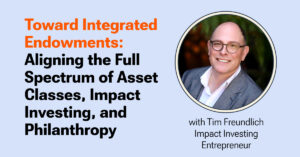As part of its Resilient Philanthropy series, Foundant recently hosted a conversation with three scholarship providers about what they learned during the pandemic and how they used that information to create greater impact for the students they serve. This blog post is the first in a three-part series that will highlight lessons learned and promising practices.
Despite the devastation it has wrought for millions of Americans, the COVID-19 pandemic served to spotlight the needs of individuals, families, and communities. Similarly, students’ needs have been further illuminated, offering scholarship providers an opportunity to adapt and better meet these needs. Foundant client Thurgood Marshall College Fund (TMCF), for example, responded by developing a COVID-19 emergency fund to help support student resilience during the pandemic.
Watch the webinar Foundant recently hosted with TMCF and other scholarship providers to hear more about their experiences and lessons learned. Also read the following summary of TMCF’s recommended process for building responsive, resilient student support.
Gather Information
Start by listening and learning from those you serve. TMCF learned a great deal about its applicants by asking questions, such as “Tell us about your current financial circumstances.” and “How have things changed for you during the pandemic?”
Look for Trends
Once you have gathered information, analyze it more closely. What are you learning? Are the same issues being repeatedly reported? TMCF applicants consistently described needing laptops and reliable internet access to make the transition to online learning. When students also reported loss of jobs, income, and work hours, the TMCF team understood that those applicants would struggle to afford the required technology.
Brainstorm Solutions
After identifying trends, consider how your program or organization might assist. Brainstorm ideas that align with your organizational mission, vision, and values; budget; staff capacity; and timelines. Like TMCF, you might determine that you can offer additional support to meet student needs. This could be as part of an existing award or program, or a new, standalone opportunity. You might also realize that it would be better for your organization to put such an initiative in place down the road, or to work with a partner organization.
Create a Pilot Opportunity
Sometimes it’s best to start small. A pilot program allows for greater information collection and can let you hone and refine your model. TMCF briefly offered its initial COVID-19 emergency fund opportunity in April 2020. Within just a few days, they learned a great deal about the demand for immediate funding for unexpected expenses and the types of items students were struggling to afford.
Evaluate Your Results
Following your initial pilot program, assess how things went. Did you meet student needs? What were the outcomes? Did anything surprise you? After exhausting the funding for their first emergency fund opportunity, the TMCF team considered the number of requests, dollar amounts requested, specific expenses incurred, and whether the quick infusion of funding allowed students to continue with their schooling (among other data points). They determined there was a definite need for support, and more thorough analysis led them to understand that while the maximum award amount seemed sound, the expense categories should be expanded to include health care costs such as mental health counseling. In follow-up surveys, many students said the support helped them persist through the Spring 2020 semester, making the difference TMCF had sought.
Institutionalize Successful Programming
If you realize your desired outcomes and positively impact students, consider expanding your initial efforts or creating a longer-term initiative. A second or third iteration might look different from the first, depending on what you learn during your evaluation. TMCF continued to offer additional COVID-19 emergency fund opportunities throughout 2020 and 2021, though each subsequent offering was adjusted based on what they learned in previous cycles.
Learn More
Also read the next two blogs in the series for more practical advice from fellow scholarship providers:
- Building Student Resilience into Scholarship Program Management
- Students as Changemakers: One Scholarship Approach to Creating Resilient Programming
Also watch a recent educational webinar, Increasing Access for All Students through Data-Driven Practices, co-hosted by National Scholarship Providers Association (NSPA) and Foundant Technologies (click the link in the slide deck to access the video recording).
Erika Orsulak

Erika Orsulak, MPA, is a consultant and advisor to scholarship providers. Using expertise in organizational leadership, program management, development, marketing, and communications, she guides clients on strategy, program administration, technology, and stakeholder engagement. Erika has worked in the scholarship industry for ten years and in philanthropy for the entirety of her 20-year career.
This blog is an original work of the attributed author. It is shared with permission via Foundant Technologies’ website for informative purposes only as part of our educational content in the social good sector. This text’s views, thoughts, and opinions belong solely to the author and do not necessarily reflect Foundant’s stance on this topic.

